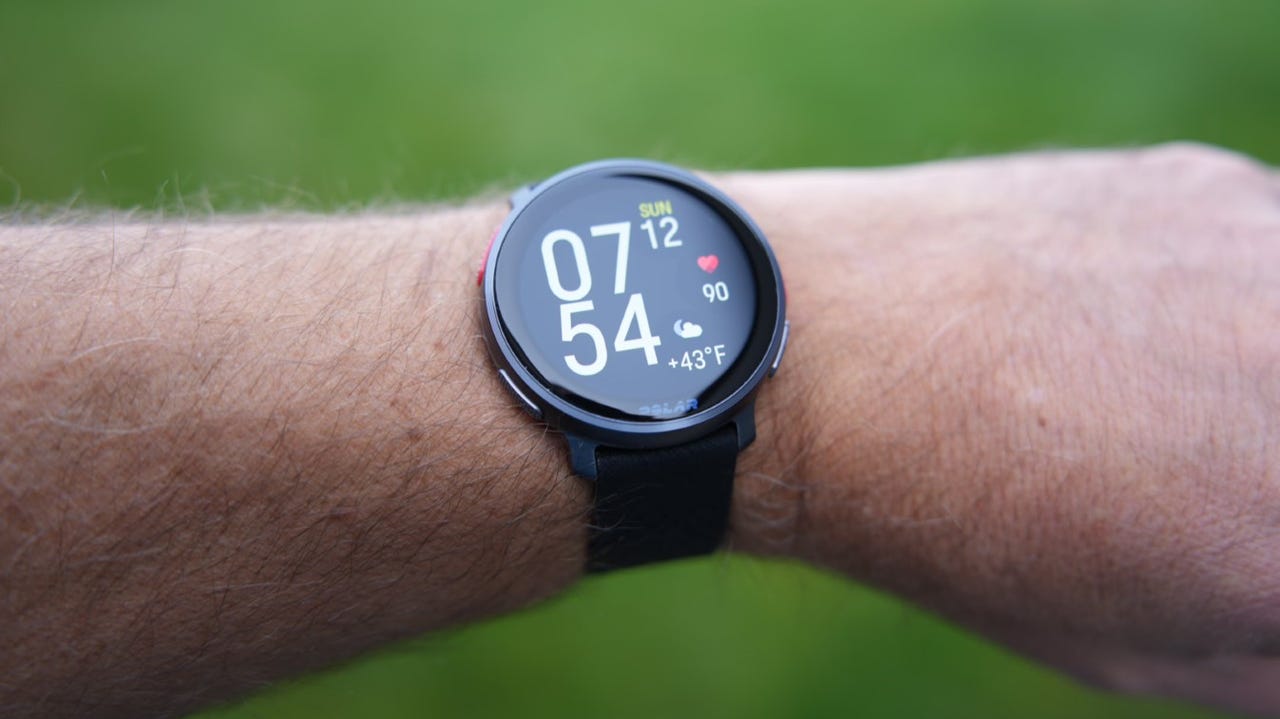
The Polar Vantage V3 is available now in three different colors for $599. It’s been three years since the last Vantage smartwatch was released.
- An AMOLED display marks a major hardware improvement, with onboard maps, dual-frequency GPS, and advanced sleep metrics support.
- Heart rate tracking performance is questionable and the price is a bit high compared to the competition.
The newest Vantage V3 from Polar brings most of the modern design features I have come to enjoy on competing smartwatches, and it’s a notable leap forward from the V2 model that launched three years ago. The V3 smart watch has a lovely AMOLED touchscreen display, dual-frequency GPS, onboard maps, and even support for wrist-based ECG.
See also: The Uses of GPS Sports Watches and How to Choose the Best for Your Fitness Tracking Needs
I spent a couple of weeks running, walking, rowing, and sleeping with the Polar Vantage V3, and it’s safe to say that it’s a compelling GPS sports watch for the right customer. If onboard music playback capability, wrist-based payment services, and third-party app store matter to you, look elsewhere.
Instead, the watch is focused on helping more serious athletes to understand their body, follow guided training plans, and track every detail of their exercise regime to improve their performance. Read on.
Also see: Smart Rings: Top Ten Uses and How to Choose the Best One
Polar Vantage V3
The Vantage V3 is available in Night Black (the device we tested), Sky Blue, and Sunrise Apricot for $599.95. I’d recommend picking one up with the H10 heart rate monitor for better accuracy.
As I mentioned, a significant hardware change with the V3 model is the shift to a 1.39-inch AMOLED display that is vibrant with a high 454 x 454-pixel resolution. The watch measures 47mm in diameter with a thickness of 14.5mm and 57 grams with the strap attached.
The strap is another hardware improvement on the device, as Polar now supports standard 22mm watch bands without the need for an adapter. Five tactile buttons are found on the watch, which is almost a few too many, alongside the standard touchscreen navigation. The watch material is aluminum with a curved Gorilla Glass display. Up to 50-meter water resistance is provided for full swimming support.
Also see: A Comprehensive Guide to Selecting the Best Smartwatch
Polar advertises up to 61 hours of battery life in GPS training mode and up to 288 hours in watch mode. Enabling the always-on watch face will reduce battery life, as it does with every watch today sporting an AMOLED display. The advertised battery life matches my experience.
Running power from the wrist, without the need for an external accessory, was introduced by Polar a few years ago. All of the standard Polar features we have come to experience over the past couple of years are also present, including Nightly Recharge, Hill Splitter, FitSpark, FuelWise, Training Load Pro, and much more.
New software features include offline map support and turn-by-turn guidance powered by Komoot. Nightly skin temperature tracking is also provided for more accurate analysis of your sleep and recovery. You can also now measure your ECG, but Polar just captures the data and does not indicate whether or not the data results in possible irregular heartbeat or arrhythmia. The ECG is not certified, so if Polar ends up going through the governance process, then the experience may match what we see from the likes of Garmin, Apple, and Samsung.
It has been a couple of years since I tested a Polar watch and I am very pleased to see that the Polar Flow smartphone application has been improved to provide a more useful diary view that includes your cardio load status, activity status, nightly recharge, boost from sleep, sleep details, and skin temperature. There are other items you can toggle on or off in the settings for the diary view.
Also see: Unlocking the Power of Fitness Trackers: How to Select the Best One
The new boost from sleep metric is interesting as it shows times when you are likely to have improved performance due to your sleep from the night before. The first couple of nights that I slept with the watch, the device did not start sleep tracking for a couple of hours. Thankfully, you can now go into the smartphone app and adjust the sleep time to correct for inaccuracies in the sleep-tracking times. I used the Oura Ring and another watch to validate my sleep times.
Also: These are the 7 best (and most accurate) sleep trackers you can buy
It’s great to see improvements in the smartphone app, but the true power of the Polar platform is found in the Polar Flow website. The vast amount of data captured by the Vantage V3 is presented in various sections and reports to help you fully analyze your performance. Polar is primarily focused on running and its personalized training programs for runners are superb. The inclusion of strength, core, and mobility exercises that work with the watch is very useful. If you follow the program, I’m confident that you will likely see results.
In regards to pricing and features, the closest Vantage V3 competitors are the Garmin Forerunner 965 and Coros Apex 2 Pro. Garmin offers a lot more when it comes to additional features, such as support for offline subscription music and Garmin Pay. Coros is more focused on athlete enhancement and training, but the Apex 2 Pro is also $150 less than the Polar Vantage V3.
That’s why, other than the current state of the heart rate accuracy, the Polar Vantage V3 is a solid option for runners who want a no-frills GPS sports watch that provides ways to dive into every finite detail of the data. I appreciate the AMOLED display, elegant design, useful watch dashboards, and Polar Flow app, even if the price may be a bit tough to justify with the competition.




















